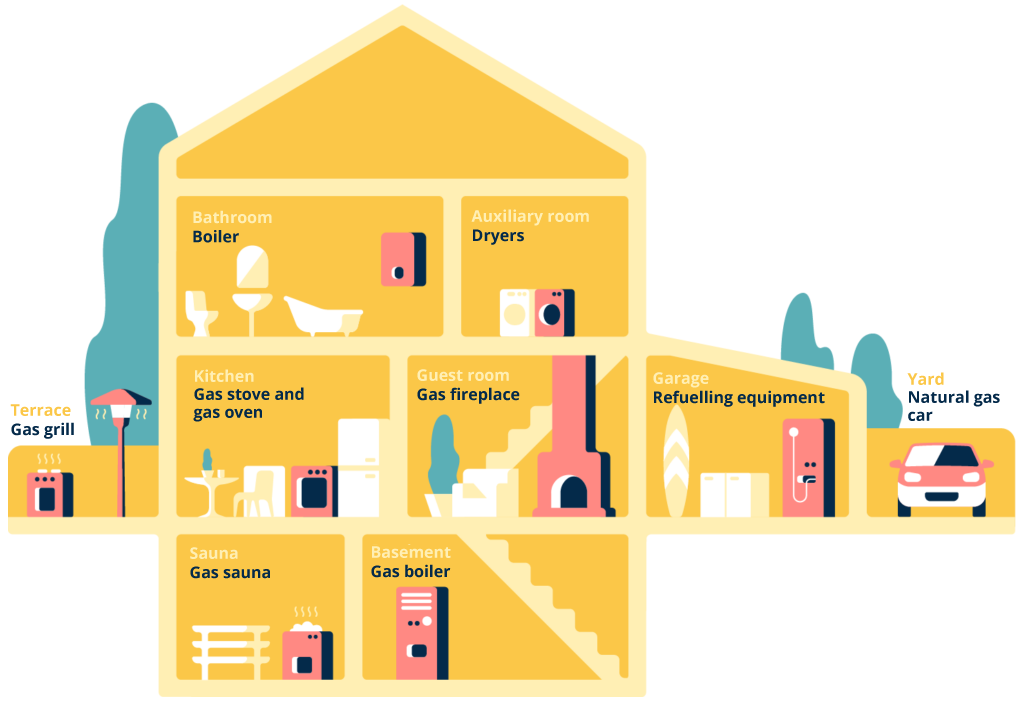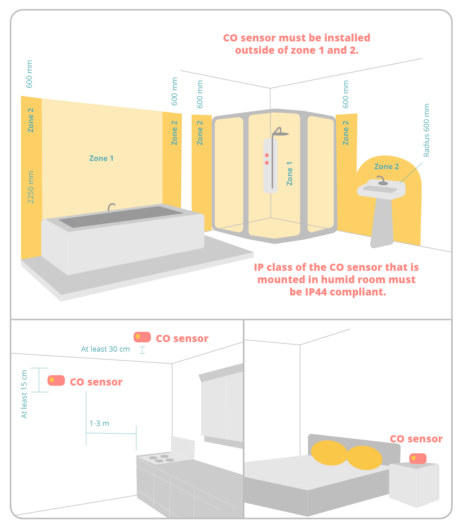Natural gas - clean and convenient
Advantages of natural gas
Natural gas is a very clean and convenient source of energy. Compared to alternative local energy sources, the cost of gas heating is lower than electric or oil heating. If heat pumps require the help of electric heating in the event of real colds and incur hidden costs, then gas boilers do not need an additional source.
As a gas consumer, you don’t have to clean the ashes from your stove/fireplace every day, store pellets or buy diesel fuel. Modern gas boilers are controlled automatically, keeping your home warm even when you are away from home for a long time.
When burning completely natural gas does not emit harmful combustion emissions, dust or soot. The process leaves behind only carbon dioxide and water vapour. In addition, gas pipelines make energy transportation easier and reduce pollution and noise. Natural gas does not pollute the surrounding air and spares our forests.
A gas connection increases the value of the property and helps to maintain it, which is important if you have purchased the property with the help of a bank loan or want to sell it in the future.

[/columns_col] [/columns]
Tips for saving on heating costs
- Choose the right system.
When building a heating system, consult a specialist so that the boiler to be installed has the optimum power. - Put the technique to work for you.
Modern boilers have modern control automation. Take advantage of technology, such as setting the machine so that the room temperature is a few degrees lower when you are asleep or away from home. - Adjust the boiler temperature.
Lower the temperature of the domestic hot water when it is not used anyway. This way you can avoid water heating in vain. - Let the warmth circulate.
Do not place cabinets or shelves in front of the radiator, as this will prevent the warmth from moving.
- Let the cold stay outside.
When it gets dark, lower the window blinds. This way, the glass does not spread cold into the room. - Ventilate the room in the right way!
Open the windows completely for a short time, closing the radiator thermostat and also the energy consumption. - Have the boiler maintenance at least once a year.
An unmaintained boiler has a higher flue gas temperature and also energy consumption. In addition, an unmaintained heater can endanger both human health and property.
Gas safety
Natural gas is a very convenient and clean fuel and its combustion emits only water vapour and a small amount of carbon dioxide. However all use and safety requirements must be carefully met.
Gas boilers and water heaters must be maintained regularly, preferably once a year. Unmaintained equipment can increase energy consumption and accidents. Maintenance care should be performed by a trusted and licensed service provider.
Gas needs oxygen
The gas equipment must be protected from dust and connected to a clean flue that is suitable for natural gas flue gases and must be of an appropriate size. The room in which the gas equipment is located must have sufficient air flow to ensure complete combustion of the natural gas.
The complete burning of one cubic metre of gas requires about 10 cubic metres of air. The supply of fresh air must be provided in small rooms, especially in bathrooms, by using an air grille or an opening under the door.
Causes of gas accidents
- Appliances that have not been maintained, old pipes and negligence.
- Unauthorized repair of ventilation pipes or flue exhaust pipe, or diversion of the gas equipment flue to the wrong pipe.
- Clogged flue exhaust pipe.
- Damaged or rusty pipes and connections.
- Use of materials not suitable for gas in pipe installation.
- Small and unventilated rooms with insufficient air flow for the gas equipment.
- Worn out gas equipment.
Useful to know
- The gas flame must be blue and not yellow (also applies to the hob).
- If the ceiling turns yellowish or brown, there are problems with the chimney.
- If you suspect any faults, a check must always be carried out. This work can only be performed by a company or a person with the appropriate qualifications.
- A carbon monoxide detector must be installed in all living areas where there is gas equipment connected to the chimney.
Carbon monoxide detector
Carbon monoxide is produced by incomplete combustion of the fuel. Carbon monoxide is colourless, odourless, tasteless and very dangerous.
The first signs of carbon monoxide poisoning are headache, dizziness, tiredness and nausea. A person might not associate these symptoms with poisoning and they may be completely imperceptible when sleeping and cause death.
The carbon monoxide sensor signals when the concentration of carbon monoxide in the air is approaching a level that is dangerous to human health.
Carbon monoxide detectors should be installed in all living areas where there is gas equipment, such as gas boiler or water heater connected to the chimney, as well as in rooms with wood-burning stove or fireplace.
Where to install a carbon monoxide detector
Unlike a smoke detector, a carbon monoxide sensor must be installed on the room wall at a height of 0.5 to 1.5 metres from the floor and up to 3 metres from the carbon monoxide source. The sensor must not be placed near ventilation systems. If the gas boiler is in the bathroom, make sure that the carbon monoxide sensor is suitable for installation in wet areas.
In rooms without immediate heating device, the detector should be placed close to the human breathing radius. For example, in the living room, the sensor must be placed at the height of a person’s face, when sitting on a sofa or chair. In bedrooms, the carbon monoxide sensor must be as close to the bed as possible.
One sensor is for one room only, as the device measures the level of carbon monoxide next to the sensor. In multi-storey residential buildings, it is recommended to install a detector on each floor, as well as in each bedroom.

Gas leak
For safety reasons a distinctive aroma is added to natural gas used in homes and offices in order for people to be able to smell a gas leak. Possible gas leaks in underground piping systems are detected with specialized gas measuring instruments.
In the case of a gas leak, you must
- Shut off the gas supply if possible.
- Ventilate the rooms by opening doors and windows.
- Not use naked flames or electricity and, if possible, turn off the electricity supply to the gas leak area.
- Leave the danger area.

Useful to know
The owner of the network contract can contact our customer support team by calling +37168806680 or writing an e-mail to info@elenger.lv for additional information on signing a natural gas trade contract. The contract must be signed no later than on the 15th day of the month preceding the month in which the new natural gas trade contract begins. The owner no longer needs to take any further action; Elenger will inform the distribution system operator of the change of trader and take all necessary actions.
In the case of a new network contract, the natural gas trade contract may be initiated at another time. The natural gas trade contract will enter into force at the same time as the new network contract.
If a smart meter is not installed at the place of gas consumption, the gas meter reading must be provided as an integer, rounded up, in the last 5 days of each month. The user’s name and address must be provided when submitting the gas meter reading. It can be submitted:
- By using mans.gaso.lv.
- By sending the reading by e-mail to info@gaso.lv.
- By providing the reading by phone on 155 or by SMS.
Before concluding the contract, get acquainted with the general terms and conditions of natural gas trade. The general terms and conditions are an essential part of the contract.
Connection to the gas network means building a connection from the land plot boundary. In addition, it is necessary to create a gas supply system on the land plot and in the building and install gas equipment, then you can start using gas.
If your property does not have a gas supply, you need to find out the nearest available gas pipeline and in which gas supply area your property is located.
You can use the information and instructions compiled by the system operator Gaso HERE.